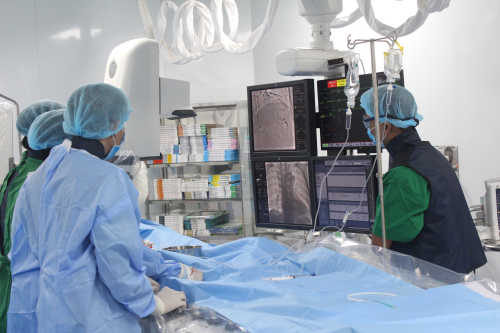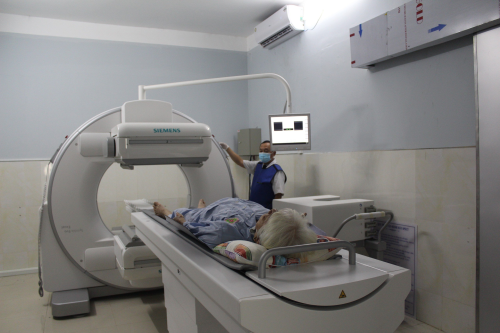Efficiency in learning and following Uncle Ho’s teachings at Military Hospital 121
Enhancement of medical ethics, deepening of medical expertise, excellence in medical skills, and promotion of scientific research and technological applications in diagnosis and treatment are the prominent aspects emphasised in learning and following Uncle Ho’s teachings at Military Hospital 121. This serves as a crucial foundation, motivating cadres, doctors, and staff to uphold traditions, overcome difficulties, and excellently fulfil assigned tasks.
Established on March 15th, 1964, during the most challenging and fierce period of the resistance war against the United States, Military Hospital 121 (under Military Region 9), formerly known as Z12 Military Medical Institute, has over 60 years of development, service in combat, and maturity. Its cadres, staff, and soldiers have overcome hardships and sacrifices, contributing significantly to the nation’s liberation and defence efforts. Throughout the resistance war against the United States, Southwest border defence campaigns, and international missions, the hospital treated thousands of wounded and sick soldiers across the battlefields of the Southwestern region, contributing significantly to the nation’s liberation and defence.
Amidst the country’s renewal period, the hospital quickly adopted new diagnostic and treatment techniques, organised specialised training for its personnel to meet the healthcare needs of cadres, soldiers, and civilians in the Mekong Delta region. It also conducted free medical services for policy beneficiaries in remote, rural, and revolutionary base areas and participated in overcoming the consequences of natural disasters and search and rescue to achieve practical results. Notably, during the Covid-19 pandemic, the hospital’s staff demonstrated the noble qualities of “Uncle Ho’s Soldiers” and medical ethics, selflessly serving the people, actively participating in pandemic prevention and control efforts, safeguarding lives and public health. During the peak periods of the pandemic, the hospital deployed hundreds of medical personnel to Field Hospitals 6 and 6B and actively supported provinces of Kien Giang, Soc Trang, and Ho Chi Minh City, treating thousands of patients and administering nearly 52,000 vaccine doses, ensuring absolute safety. Thanks to particularly outstanding achievements, the Hospital (twice), Treatment Team 1 (once), and five individuals were honoured as Heroes of the People’s Armed Forces and many noble awards, embellishing traditions of “Preserving medical ethics, improving medical skills, being proactive and creative, unite with the people, and be determined to win.”
 |
| Treatment with Digital Subtraction Angiography (DSA) technology |
For achieving these outstanding results, the Hospital Party Committee and Management Board, Party committees, and commanders of departments have concentrated on leading and directing the synchronised implementation of policies and solutions. In particular, promoting learning and following Ho Chi Minh’s thoughts, ethics, and style is the basic solution, becoming the regular job of every cadres, nurse, doctor, and military medical staff.
Embracing Uncle Ho’s advice to medical workers to “..treat patients as their own sibblings, considering patients’ pains as their own. A physician must be like a mother,” the hospital focuses on enhancing the “moral ethics” for doctors and medical staff. Accordingly, the hospital requires Party committees and department commanders to strictly adhere to Party and healthcare sector resolutions and decisions regarding patient care, building the service style and attitude of medical personnel. These measures include various forms and methods such as resolution studying, training, briefings, or practical medical examinations, focusing on behavioral culture, communication, and caring service attitude to maintaining a good image and enhance the hospital’s reputation. Furthermore, the hospital strengthens traditional education to elevate the consciousness and responsibility of military doctors towards the motto “All for the satisfaction of the patients.” It also promotes movements and social activities such as “Military doctors following Uncle Ho’s teachings,” “Humanitarian blood donation,” “For community health,” fostering motivation for every military doctor and medical staff to self-improve and enhance their “medical ethics”. Additionally, it enhances the role of social working teams in solving examination and treatment issues, ensuring transparency in examination and treatment procedures, administrative reform, and rigorous inspection to safeguard patients’ rights.
Along with that, it strengthens the organisation of military medical teams to carry out medical examination and treatment in remote areas to feel and understand the hardships and difficulties of the soldiers and people, thereby, further motivating them with feelings of sharing and gratitude to continue to commit to the mission of “treating diseases and saving people”; regularly pays attention and takes care of material and spiritual life, helping cadres and medical staff under to stabilise their family economy, in order to completely overcome the negatives that arise; strengthens inspection of the implementation of 44 professional regimes, advice box, and hotlines to receive feedback, promptly correct errors, and strictly handle cases of “medical ethics” violations. Thanks to that, 100% of the hospital’s cadres, employees, and soldiers have a high sense of responsibility, wholeheartedly love and care for patients, and say “no” to bureaucracy, authority, harassment,... building a noble image of the “Army Doctor”.
In his letter to the National Conference of Medical Cadres, Uncle Ho advised and requested doctors and nurses that “Professionally, we need to always study and research to always improve, but what must we focus on? practical and appropriate to our current resistance situation.” Deeply absorbing His advice, along with enhancing “medical ethics”, the hospital focuses on building a contingent of medical cadres and staff “Deep in medical ethics, good in medical skills” and identifies this as a fundamental and long-term issue. From 2013 to 2023, the hospital sent more than 1,000 doctors, nurses, and technicians to specialised training courses at academies and schools inside and outside the Army, organised hundreds of scientific activities, and assigned staff to attend scientific conferences held by civiliand and military hospitals, so that they update new medical knowledge, etc. At the same time, it organised training sessions on techniques and emergency treatment of specialties: cardiovascular, endocrine, neurology, emergency resuscitation, anesthesia surgery, endoscopic surgery, subclinic; strengthened scientific and technical cooperation with higher-level hospitals; and organised cooperative training of nursing colleges, pharmaceutical colleges, and short-term specialties, contributing to improving the level and skills for this important contingent. Along with that, it arranged and adjusted the departments, boards, and the contingent of medical cadres and staff to facilitate them, especially deep-specialised cadres, to promote good specialty competence, experience, and strengths in performing tasks. Thanks to that, so far the professional contingent of the hospital has been developed both in quantity and quality. The rate of postgraduate doctors accounts for about 60%. The capacity of the team of military medical cadres and staff is increasingly improved with a solid, appropriate inheritance generation, overcoming the shortage of sources or empty sources in departments and boards, meeting the increasingly high requirements of the task of reception, examination, and treation, commensurate with a grade I hospital, the end line of the Military Region.
 |
| Screening cancer with SPECT/CT scanner |
In line with Uncle Ho’s teaching that “Medicine must be based on the principles of science, national identity, and public welfare,” the hospital focuses on intensifying scientific research activities. Annually, therefore, the hospital outlines specific research projects and assigns cadres to participate in. All research projects are registered with the Military Scientific Research Department/General Staff, Planning and Advisory Department/General Logistics Department according to regulations. This includes increasing the quantity and quality of research projects, ensuring that the content serves the practical needs of diagnosis and treatment, thereby enhancing the quality and value of research projects in practice. Along with that, scientific activities are maintained regularly and with high quality by the departments and boards (in the past 10 years, more than 100 information sessions have been organised; nearly 120 projects have been researched and accepted; 4 scientific conferences have been organised,…), thereby, contributing to improving the professional qualifications of cadres, doctors, and military medical staff and effectively carrying out the hospital's duties.
Regarding technical application, the hospital well maintains techniques according to hierarchy and deploys some new ones. In surgery, minimally invasive treatment techniques are increasingly widely applied and bring high efficiency, such as: inguinal hernia surgery, goiter, treatment of post-surgery intestinal adhesions, cervical spine disc replacement, thoracic myeloma, artificial vertebrae replacement, percutaneous screw placement in treatment of vertebral fractures, skull shaping using Titanium material,..., bio-cement injection for percutaneous vertebral body shaping, laparoscopic colectomy, etc. In particular, the artificial hip replacement technique has been applied by the hospital since May 2015, and has been a successful treatment, contributing to returning functions and vital organs to patients, reducing the death rate for elderly patients having femoral neck fracture and normal walking for people with long-term hip osteoarthritis. Regarding internal medicine, techniques to measure respiratory function, flexible bronchoscopy, and emergency treatment in patients with mechanical ventilation has been implemented with good results. These are very important contents, contributing to improving the quality of medical examination and treatment for soldiers and people in the Mekong Delta region, worthy of being a end-line hospital of Military Region 9.
Senior Colonel, Elite Doctor NGUYEN MINH THUAN, Director of the Hospital